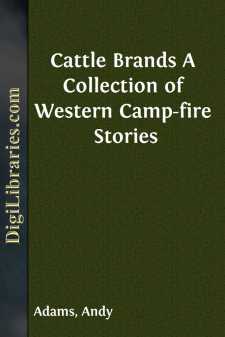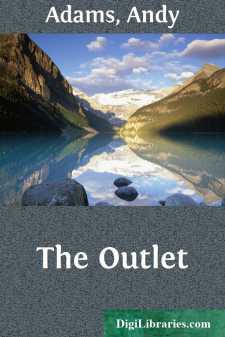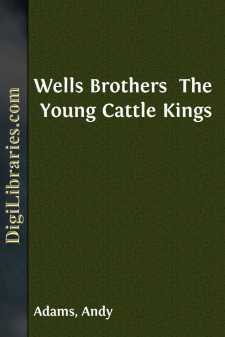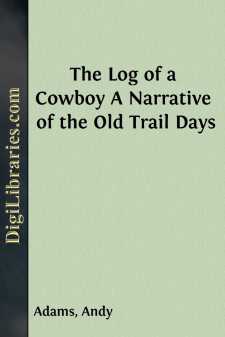Categories
- Antiques & Collectibles 13
- Architecture 36
- Art 48
- Bibles 22
- Biography & Autobiography 813
- Body, Mind & Spirit 142
- Business & Economics 28
- Children's Books 14
- Children's Fiction 11
- Computers 4
- Cooking 94
- Crafts & Hobbies 4
- Drama 346
- Education 46
- Family & Relationships 57
- Fiction 11828
- Games 19
- Gardening 17
- Health & Fitness 34
- History 1377
- House & Home 1
- Humor 147
- Juvenile Fiction 1873
- Juvenile Nonfiction 202
- Language Arts & Disciplines 88
- Law 16
- Literary Collections 686
- Literary Criticism 179
- Mathematics 13
- Medical 41
- Music 40
- Nature 179
- Non-Classifiable 1768
- Performing Arts 7
- Periodicals 1453
- Philosophy 64
- Photography 2
- Poetry 896
- Political Science 203
- Psychology 42
- Reference 154
- Religion 513
- Science 126
- Self-Help 84
- Social Science 81
- Sports & Recreation 34
- Study Aids 3
- Technology & Engineering 59
- Transportation 23
- Travel 463
- True Crime 29
A Texas Matchmaker
by: Andy Adams
Description:
Excerpt
CHAPTER I
LANCE LOVELACE
When I first found employment with Lance Lovelace, a Texas cowman, I had not yet attained my majority, while he was over sixty. Though not a native of Texas, "Uncle Lance" was entitled to be classed among its pioneers, his parents having emigrated from Tennessee along with a party of Stephen F. Austin's colonists in 1821. The colony with which his people reached the state landed at Quintana, at the mouth of the Brazos River, and shared the various hardships that befell all the early Texan settlers, moving inland later to a more healthy locality. Thus the education of young Lovelace was one of privation. Like other boys in pioneer families, he became in turn a hewer of wood or drawer of water, as the necessities of the household required, in reclaiming the wilderness. When Austin hoisted the new-born Lone Star flag, and called upon the sturdy pioneers to defend it, the adventurous settlers came from every quarter of the territory, and among the first who responded to the call to arms was young Lance Lovelace. After San Jacinto, when the fighting was over and the victory won, he laid down his arms, and returned to ranching with the same zeal and energy. The first legislature assembled voted to those who had borne arms in behalf of the new republic, lands in payment for their services. With this land scrip for his pay, young Lovelace, in company with others, set out for the territory lying south of the Nueces. They were a band of daring spirits. The country was primitive and fascinated them, and they remained. Some settled on the Frio River, though the majority crossed the Nueces, many going as far south as the Rio Grande. The country was as large as the men were daring, and there was elbow room for all and to spare. Lance Lovelace located a ranch a few miles south of the Nueces River, and, from the cooing of the doves in the encinal, named it Las Palomas.
"When I first settled here in 1838," said Uncle Lance to me one morning, as we rode out across the range, "my nearest neighbor lived forty miles up the river at Fort Ewell. Of course there were some Mexican families nearer, north on the Frio, but they don't count. Say, Tom, but she was a purty country then! Why, from those hills yonder, any morning you could see a thousand antelope in a band going into the river to drink. And wild turkeys? Well, the first few years we lived here, whole flocks roosted every night in that farther point of the encinal. And in the winter these prairies were just flooded with geese and brant. If you wanted venison, all you had to do was to ride through those mesquite thickets north of the river to jump a hundred deer in a morning's ride. Oh, I tell you she was a land of plenty."
The pioneers of Texas belong to a day and generation which has almost gone. If strong arms and daring spirits were required to conquer the wilderness, Nature seemed generous in the supply; for nearly all were stalwart types of the inland viking. Lance Lovelace, when I first met him, would have passed for a man in middle life....






